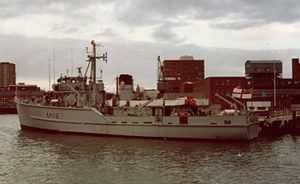HMS Wilton (M1116)
 |
| Career (UK) |
 |
| Name: |
HMS Wilton (M1116) |
| Operator: |
Royal Navy |
| Ordered: |
11 February 1970 |
| Builder: |
Vosper Thornycroft, Woolston |
| Laid down: |
7 August 1970 |
| Launched: |
18 January 1972 |
| Commissioned: |
14 July 1973 |
| Decommissioned: |
1994 |
| Fate: |
Sold 2001, towed to Southampton for conversion as yacht club at Leigh-on-Sea |
| General characteristics |
| Class and type: | Wilton-class minesweeper |
| Displacement: | 450 tons |
| Length: | 153 ft (47 m) |
| Beam: | 29.2 ft (8.9 m) |
| Draught: | 8.5 ft (2.6 m) |
| Propulsion: | 2 × Napier Deltic 18-7A diesel engines @ 3,000 bhp |
| Speed: | 16 knots |
| Range: | 2,300 nmi at 13 knots |
| Complement: | 37 men |
| Armament: | 1 × Bofors 40 mm gun |
HMS Wilton (M1116) was a prototype coastal minesweeper/minehunter for the Royal Navy. She was the first warship in the world to be constructed from glass-reinforced plastic. Her design was based upon the existing Ton class minesweepers, and she was fitted with equipment recovered from the scrapped HMS Derriton. The use of GRP gave the vessel a low magnetic signature against the threat of magnetic mines.
On commissioning, Wilton joined the 2nd Mine Counter Measures Squadron based at Portsmouth. In 1974, she took part in Operation Rheostat, the Royal Navy's part of the international efforts to clear the Suez Canal of mines. In November that year, Wilton rejoined 2nd MCMS, interrupting her service with that squadron to be seconded to STANAVFORCHAN, NATO's Standing Naval Force Channel in 1977 and 1980.[1]
Wilton was unofficially known as HMS Tupperware, HMS Indestructible, and "The Plastic Duck" or "Plastic Pig". She was retired by the Royal Navy in 1994; she ended up in store until being sold in August 2001, when she was fitted out as the new home of the Essex Yacht Club at Leigh-on-Sea on the Thames Estuary.
References
External links
|
|---|
| | Sailing ships | |
|---|
| | Steamships | |
|---|
| | Motor vessels | |
|---|
| | Canal vessels | |
|---|
| | Lifeboats | |
|---|
| | Lightships | |
|---|
| | Warships | |
|---|
| Vessels of the
National Historic Fleet | |
|---|
| Vessels listed on the
National Archive
of Historic Vessels | |
|---|
|
